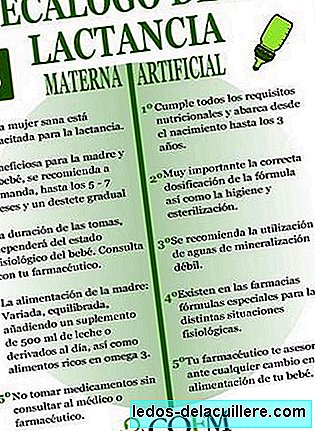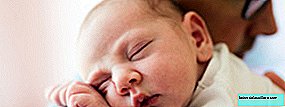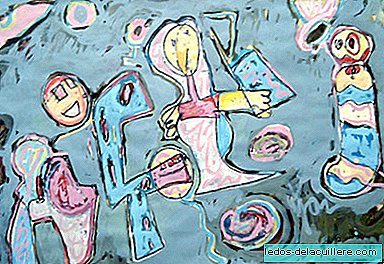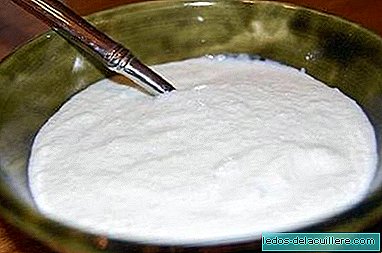
This is the poster that I find on the page of the College of Pharmacists of Madrid in the news that "Pharmacists in Madrid will educate about nutrition in pregnancy and lactation."
I thought it could be good news, however, seeing the image that is probably already showing in pharmacies, I wonder if through this decalogue they inform us or misinform us about breastfeeding.
It is a poster that is framed in the fourth edition of the Pharmaceutical Nutrition Education Plan (Plenufar), which this time will be devoted to the situations of pre pregnancy, pregnancy and lactation. Regarding the Decalogue of breastfeeding, the poster seems very unfortunate for the reasons I go on to list.
First of all, I believe that the guidelines for breastfeeding and artificial feeding should have been separated into separate posters or brochures. It is a question of ways: if I see them at the same level, it may seem to me that they are equally good (or bad), and that is not correct. And more if in the opposite terms incorrect or incomplete premises are placed that can lead to confusion, as we will see.
If I make different brochures, the ideal would be to offer the one of the LM to all the pregnant or recent moms, that is what the international health organizations recommend: to suppose that every pregnant woman is going to breastfeed, and inform and support her for it.
If any of these moms ask for information about artificial breastfeeding, or they have approached the pharmacy precisely to buy formula milk, they could be given the LA Decalogue next to LM's if they wish.
Information about breastfeeding
Regarding the points that the LM lists, I believe that almost all are improvable, incomplete or confusing to a greater or lesser extent:
Every healthy woman is trained for breastfeeding.
It is true, although it is also true that almost any sick woman is also capable of breastfeeding. There are some cases of medical reasons for not breastfeeding, a few health problems of the mother that may discourage breastfeeding.
But a woman sick with the flu, diabetes, asthma ... can breastfeed. Today, almost all maternal diseases have some treatment that can be carried out without having to stop breastfeeding.
Beneficial for the mother and the baby, it is recommended on demand, up to 5-7 months and a gradual weaning.
Here we put the objection on the dates they give us. The LM is recommended exclusively until 6 months and as a complementary, frequent and on-demand diet, up to two years or more, so those dates thus raised do not make much sense.
Regarding gradual weaning, it is true that stopping breastfeeding suddenly is not good for the baby or the mother, but it is at least curious that when talking about formula milk, do not assume any reduction in shots until three years , as we will see, and here we talk about weaning already at 5 months.
The duration of the shots will depend on the physiological state of the baby. Consult your pharmacist
I am quite perplexed at this point. If breastfeeding is on demand, you don't have to look at clocks to know how long it takes. What do they mean by "the physiological state of the baby" exactly? To hunger, to the desire of contact? That if my baby is more hungry or wants to spend more time in the chest, then the duration of the intake will be extended. Why exactly should I consult the pharmacist?
It may also mean that if the baby is sick, breastfeed less, it is normal (like other times you want to breastfeed more often). But if the baby is constipated, with fever, with diarrhea ... then you have to consult the doctor.
I think they want to complicate the simple. Nothing happens if the baby one day takes a 15-minute shot and the next half-hour (and shows no signs of illness). In addition, in case of doubt, I do not say that there will be well-trained pharmacists, although I think you can go to more trained professionals for information on breastfeeding.
For example in organizations, associations, support groups, breastfeeding guides and varied resources that we find constituted by experts: Pediatric Associations, WHO, UNICEF, the International Milk League, LACMAT ...
The mother's diet: Varied, balanced, adding a supplement of 500 ml of milk or derivatives a day, as well as foods rich in Omega 3.
In the fourth point I agree quite a lot, the mother's diet has to be healthy, varied and balanced, and it is usually pointed out that it is necessary to increase the intake of calories and the consumption of calcium, although not necessarily from dairy products. Omega-3 is also beneficial during breastfeeding.
But, for example, they do not refer to other vitamins or minerals that are recommended to increase during breastfeeding or to the only supplement for the mother recommended by the Spanish Association of Pediatrics (AEPed), that of iodine.
Do not take medication without consulting a doctor or pharmacist.
At this point we agree that we cannot self-medicate, some medications can be harmful during breastfeeding and we cannot take drugs without advice. In addition, we can consult the information on-line such as the one offered by the Pediatrics Service on the website of the Marina Alta Hospital on the risks of medications for breastfeeding.

Information on artificial feeding
Regarding the points referred to LA, I stop at the first, which is the one that has caught my attention the most.
It meets all nutritional requirements and covers from birth to three years.
Formula milk tells us that it meets all nutritional requirements, however it is breast milk that contains natural prebiotics and probiotics, defenses and many other substances that no other milk has or can not imitate and that adapt to the needs of the baby in every moment.
We can say that it is already known, that the LM is the best, but it is that in this comparative poster there has been no mention of it in the first section dedicated to the LM, removing the point that it is beneficial for the mother And for the baby.
On the other hand, while the LM tells us that it is recommended until 5-7 months, and then a gradual weaning, here it indicates that the LA covers from birth to three years.
Does it mean a recommendation to give formula milk up to three years, while the LM begins to leave at 5-7 months? Recall that the LM is recommended until two years or more, but if a child is fed with formula milk it can go from continuation to cow's milk before (normal or "growing", although these are really unnecessary).
Whole untreated cow's milk, in the case of children who do not drink breast milk, can be taken by replacing the formula from one year of age (some pediatricians do not recommend it until 18 months), why at this point Is the recommendation for formula or LA milk extended to three years? I think the answer is obvious: it responds to clear business interests.
Very important the correct dosage of the formula as well as hygiene and sterilization.
Regarding the following points, I do not have much to say: indeed, one must be very careful in dosing and hygiene when preparing the bottle. Here we have brought you the rules of the Spanish Association of Pediatrics in this regard.
The use of weak mineralization waters is recommended.
It is also better for baby water to be of weak mineralization.
There are special formulas in pharmacies for different physiological situations.
There are different formula milks on the market (although be careful, because some options are medical treatments). It should be the pediatrician which is the milk that best suits the baby and if for any reason you want to change milk, you should also consult with the doctor, as babies could have discomfort to the change of formula.
Your pharmacist will advise you about any changes in your baby's diet.
We can consult the pharmacist about the changes to be introduced in his diet, but as I said in the previous point, I think it should be the pediatrician, who monitors the health of our baby, the most suitable for this.
Conclusions
In short, we see how a supposedly informative poster can find obvious objections, because instead of informing properly it can confuse and lead to erroneous interpretations.
I get the impression that it has been done by presupposing or taking for granted the advantages and suitability of the LM, omitting them, but extolling the "correction" of the LA (and of course omitting its risks), so the balance does not seem to me balanced
As it is true that many times for a quick first consultation we ask the pharmacist for advice before going to the pediatrician or other specialists, I think that these points should be taken special care.
If from the College of Pharmacists (as from anywhere) it is intended to inform about breastfeeding, breastfeeding and artificial, it should be done with clearer and objective data, which really help, guide and support mothers who want to know more about the best way to feed their baby.












